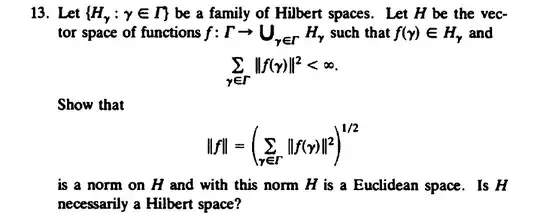Let $\{H_i\}_{i \in I}$ be an infinite collection of Hilbert spaces. I am trying to understand their "direct sum".
$\bigoplus H_i$ (algebraic sum) is an inner product space in a straightforward way. It is not, however a Hilbert space. Let $\overline{\,} : \mathbb{N} \to I$ be an injection, and $\{h_k\}_{k \in \mathbb{N}}$ such that $h_k \in H_{\overline{k}}$. Then the sequence $\sum\limits_{k=1}^n h_k$ is Cauchy, but not convergent when $\sum\limits_{k=1}^\infty \|h_k\|_{H_{\overline{k}}}^2 < \infty$.
In fact, I would like to argue that these are the only obstructions to $\bigoplus H_i$ being a Hilbert space. Unfortunately, proving it is beyond me.
Let $H \subseteq \prod H_i$ be the subset bounded with respect to the norm
$$\|h\| := \sqrt{\sum \|\pi_i(h)\|_{H_i}^2}$$
(The sum is considered infinite if more than countably many $\pi_i(h)$ are non-zero.)
I would like to prove that
- $H$ is an inner product space with the above norm
- $H$ is complete with respect to the above norm
- $\bigoplus H_i$ is a dense "subspace" of $H$
I'm looking for an accessible reference. I'm currently reading "Linear Analysis" by Bollobás, which I find very well-written. He even sets this as an exercise, but with a tone that strongly suggests that $H$ isn't complete:
